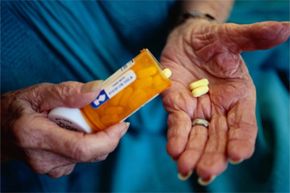Medicine can prevent polio and heal stomach ulcers, but what if it could successfully nip all diseases as soon as they showed themselves? Preposterous, isn't it? Incurable sickness is a part of everyone's life. Who hasn't stayed home with the flu? Of course, some people lose more than office sick days to illness, like their ability to walk, their vision or even their life or that of a loved one. In this article, we'll consider a world where every disease has a cure.
It's tough to imagine. Cures for everything sounds great, but what does that mean? First, it doesn't equate to prevention. For example, to protect yourself from getting HIV, you could, among other things, abstain from having sex and from sharing needles or have protected sex. Second, cures differ from treatments: HIV therapies can reduce the amount of virus in the body or help the recipient physically cope with a weakened immune system. For our purposes, a cure for HIV would mean that you could have the virus, take a pill and then no longer have the virus in your body.
Advertisement
Life with unlimited medical fixes … would doctors' offices be swamped by patients clamoring for pills? Would people live unthinkably long?
Although it's fun to ask "what if…," we should balance our fantasy with some skepticism. Could we ever achieve remedies for all diseases? Not likely. Each age bracket comes with its own illnesses. Even if we could extend the human life span to 200 by preventing maladies that kill us before we reached that age, it wouldn't be a healthy 200, but one that came with its own ailments, maybe some we've never seen before [source: Kennedy].
Another factor to keep in mind: Wealthy and poor countries have such different common diseases that we'll look at the scenario separately in each place. First up, a high-income nation where everyone's heart is healthy, even after all-you-can-eat burgers and fries.
Advertisement



